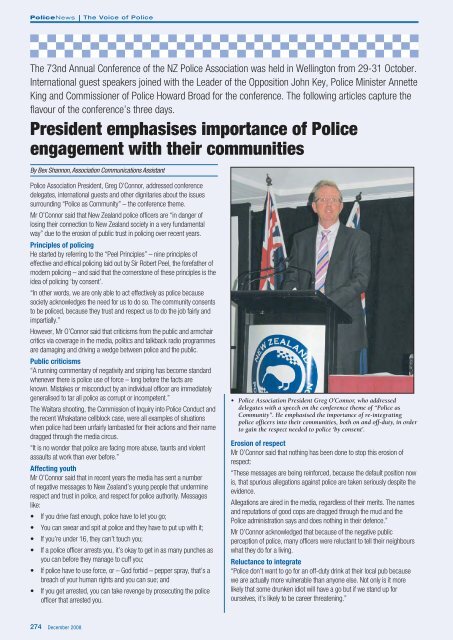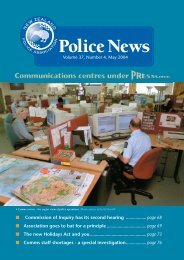Police News Dec 08.indd - New Zealand Police Association
Police News Dec 08.indd - New Zealand Police Association
Police News Dec 08.indd - New Zealand Police Association
You also want an ePaper? Increase the reach of your titles
YUMPU automatically turns print PDFs into web optimized ePapers that Google loves.
<strong>Police</strong><strong><strong>New</strong>s</strong>The Voice of <strong>Police</strong>The 73nd Annual Conference of the NZ <strong>Police</strong> <strong>Association</strong> was held in Wellington from 29-31 October.International guest speakers joined with the Leader of the Opposition John Key, <strong>Police</strong> Minister AnnetteKing and Commissioner of <strong>Police</strong> Howard Broad for the conference. The following articles capture theflavour of the conference’s three days.President emphasises importance of <strong>Police</strong>engagement with their communitiesBy Bex Shannon, <strong>Association</strong> Communications Assistant<strong>Police</strong> <strong>Association</strong> President, Greg O’Connor, addressed conferencedelegates, international guests and other dignitaries about the issuessurrounding “<strong>Police</strong> as Community” – the conference theme.Mr O’Connor said that <strong>New</strong> <strong>Zealand</strong> police officers are “in danger oflosing their connection to <strong>New</strong> <strong>Zealand</strong> society in a very fundamentalway” due to the erosion of public trust in policing over recent years.Principles of policingHe started by referring to the “Peel Principles” – nine principles ofeffective and ethical policing laid out by Sir Robert Peel, the forefather ofmodern policing – and said that the cornerstone of these principles is theidea of policing ‘by consent’.“In other words, we are only able to act effectively as police becausesociety acknowledges the need for us to do so. The community consentsto be policed, because they trust and respect us to do the job fairly andimpartially.”However, Mr O’Connor said that criticisms from the public and armchaircritics via coverage in the media, politics and talkback radio programmesare damaging and driving a wedge between police and the public.Public criticisms“A running commentary of negativity and sniping has become standardwhenever there is police use of force – long before the facts areknown. Mistakes or misconduct by an individual officer are immediatelygeneralised to tar all police as corrupt or incompetent.”The Waitara shooting, the Commission of Inquiry into <strong>Police</strong> Conduct andthe recent Whakatane cellblock case, were all examples of situationswhen police had been unfairly lambasted for their actions and their namedragged through the media circus.“It is no wonder that police are facing more abuse, taunts and violentassaults at work than ever before.”Affecting youthMr O’Connor said that in recent years the media has sent a numberof negative messages to <strong>New</strong> <strong>Zealand</strong>’s young people that underminerespect and trust in police, and respect for police authority. Messageslike:• If you drive fast enough, police have to let you go;• You can swear and spit at police and they have to put up with it;• If you’re under 16, they can’t touch you;• If a police officer arrests you, it’s okay to get in as many punches asyou can before they manage to cuff you;• If police have to use force, or – God forbid – pepper spray, that’s abreach of your human rights and you can sue; and• If you get arrested, you can take revenge by prosecuting the policeofficer that arrested you.• <strong>Police</strong> <strong>Association</strong> President Greg O’Connor, who addresseddelegates with a speech on the conference theme of “<strong>Police</strong> asCommunity”. He emphasised the importance of re-integratingpolice officers into their communities, both on and off-duty, in orderto gain the respect needed to police ‘by consent’.Erosion of respectMr O’Connor said that nothing has been done to stop this erosion ofrespect:“These messages are being reinforced, because the default position nowis, that spurious allegations against police are taken seriously despite theevidence.Allegations are aired in the media, regardless of their merits. The namesand reputations of good cops are dragged through the mud and the<strong>Police</strong> administration says and does nothing in their defence.”Mr O’Connor acknowledged that because of the negative publicperception of police, many officers were reluctant to tell their neighbourswhat they do for a living.Reluctance to integrate“<strong>Police</strong> don’t want to go for an off-duty drink at their local pub becausewe are actually more vulnerable than anyone else. Not only is it morelikely that some drunken idiot will have a go but if we stand up forourselves, it’s likely to be career threatening.”274<strong>Dec</strong>ember 2008

















